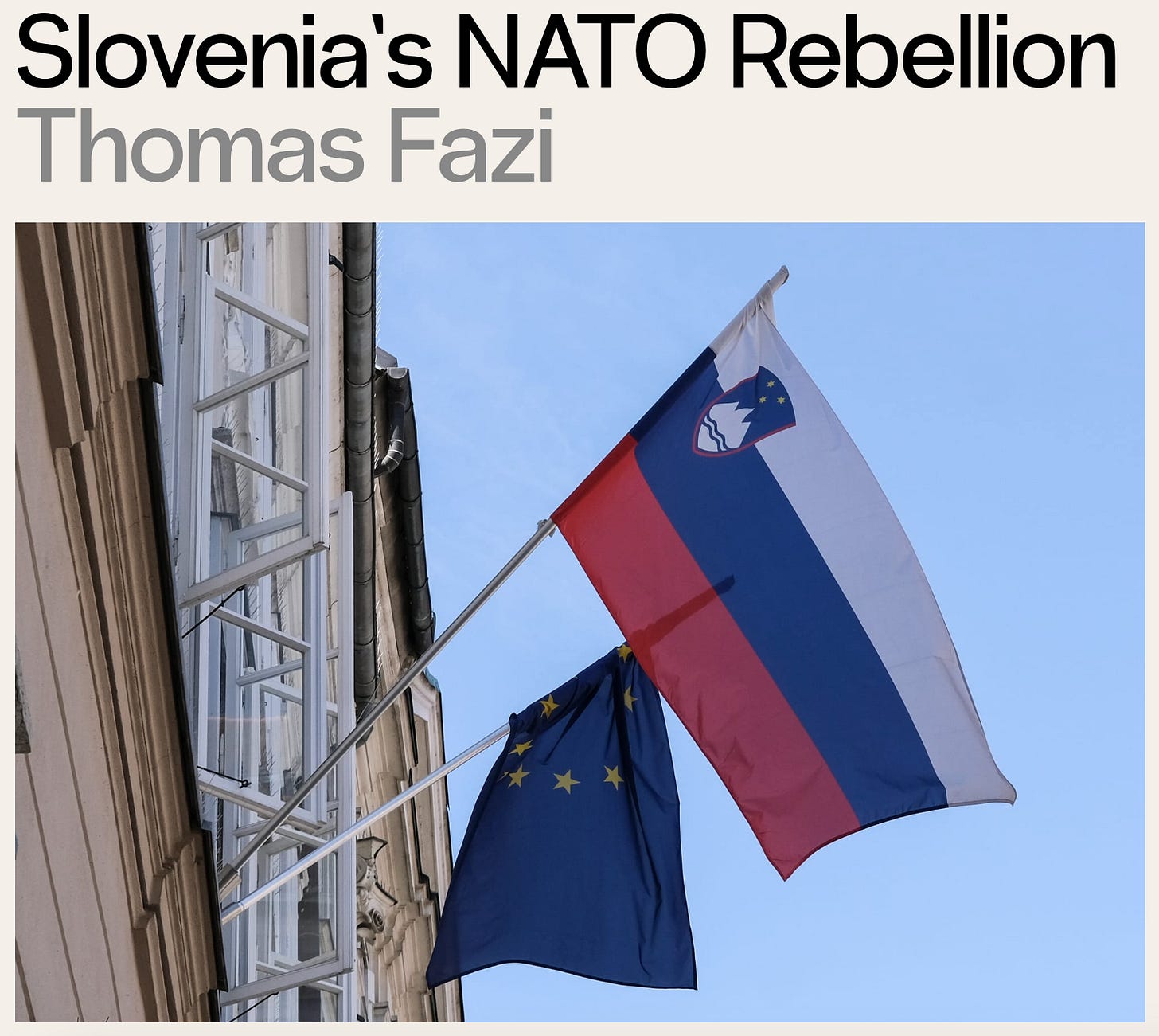Slovenia's (short-lived) NATO rebellion
Slovenia almost immediately backtracked on its decision to hold a referendum on NATO membership, but a massive ideological taboo has been broken — and may inspire others
I’ve written for Compact about Slovenia’s decision to hold a referendum on NATO membership, how this sent Euro-Atlantic elites into a panic, causing the referendum to be cancelled shortly after, and why, despite Slovenia’s about-turn, a massive ideological taboo has nonetheless been broken — and may inspire others:
[The referendum] risked igniting a political earthquake extending well beyond Slovenia’s borders. Biljana Vankovska, professor of political science and international relations at Ss. Cyril and Methodius University in Macedonia, wrote that a NATO referendum “could shatter taboos not just within Slovenia, but across Europe... Sometimes it takes a small state to shift the scales of public opinion across an entire continent”.
With so much on the line, it’s not surprising that Slovenia’s moment of dissent was extinguished just as quickly as it flared up. On July 19, Parliament voted 44-7 to cancel both proposed referendums, with most members of Parliament abstaining. […]
Still, the damage was done. The fact that such referendums were proposed at all suggests the first visible crack in NATO’s ideological fortress: A member state’s government publicly acknowledged that loyalty to the alliance is no longer beyond question. The episode may have ended, but the taboo has been broken.
This reflects a deeper crisis across Europe. As NATO’s aggressive geopolitical ambitions grow, they increasingly collide with democratic principles and public opinion. Polls in Slovenia show only 52 percent support for NATO—down sharply from the 66 percent who backed accession in 2003. EU and NATO elites are pursuing a strategy of endless expansion, militarization and confrontation with powers like Russia, China and Iran—despite widespread public opposition to war and rearmament across Europe. As the gap between elite ambition and democratic legitimacy widens, repression becomes the only glue holding the project together.
Read the article here.
Putting out high-quality journalism requires constant research, most of which goes unpaid, so if you appreciate my writing please consider upgrading to a paid subscription if you haven’t already. Aside from a fuzzy feeling inside of you, you’ll get access to exclusive articles and commentary.
Thomas Fazi
Website: thomasfazi.net
Twitter: @battleforeurope
Latest book: The Covid Consensus: The Global Assault on Democracy and the Poor—A Critique from the Left (co-authored with Toby Green)




I wish you are right……broken tabu….but all those institutions seems to oblivious to any critique. David Graeber article from 2013 might be important to reread….
If, on the other hand, we stop taking world leaders at their word and instead think of neoliberalism as a political project, it suddenly looks spectacularly effective. The politicians, CEOs, trade bureaucrats, and so forth who regularly meet at summits like Davos or the G20 may have done a miserable job in creating a world capitalist economy that meets the needs of a majority of the world’s inhabitants (let alone produces hope, happiness, security, or meaning), but they have succeeded magnificently in convincing the world that capitalism—and not just capitalism, but exactly the financialized, semifeudal capitalism we happen to have right now—is the only viable economic system. If you think about it, this is a remarkable accomplishment.
https://thebaffler.com/salvos/a-practical-utopians-guide-to-the-coming-collapse
The rulers know, never put an honest question to the masses.